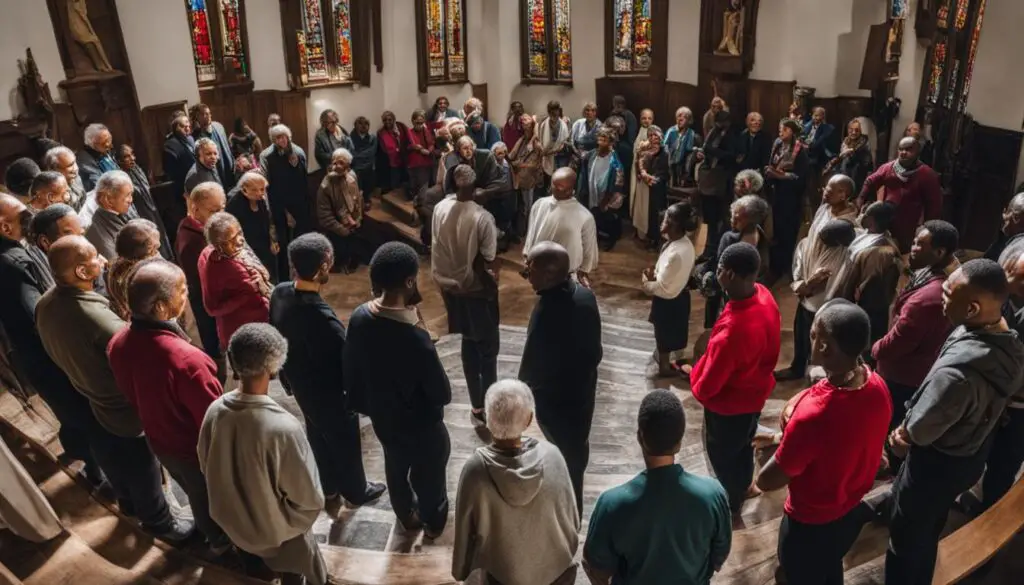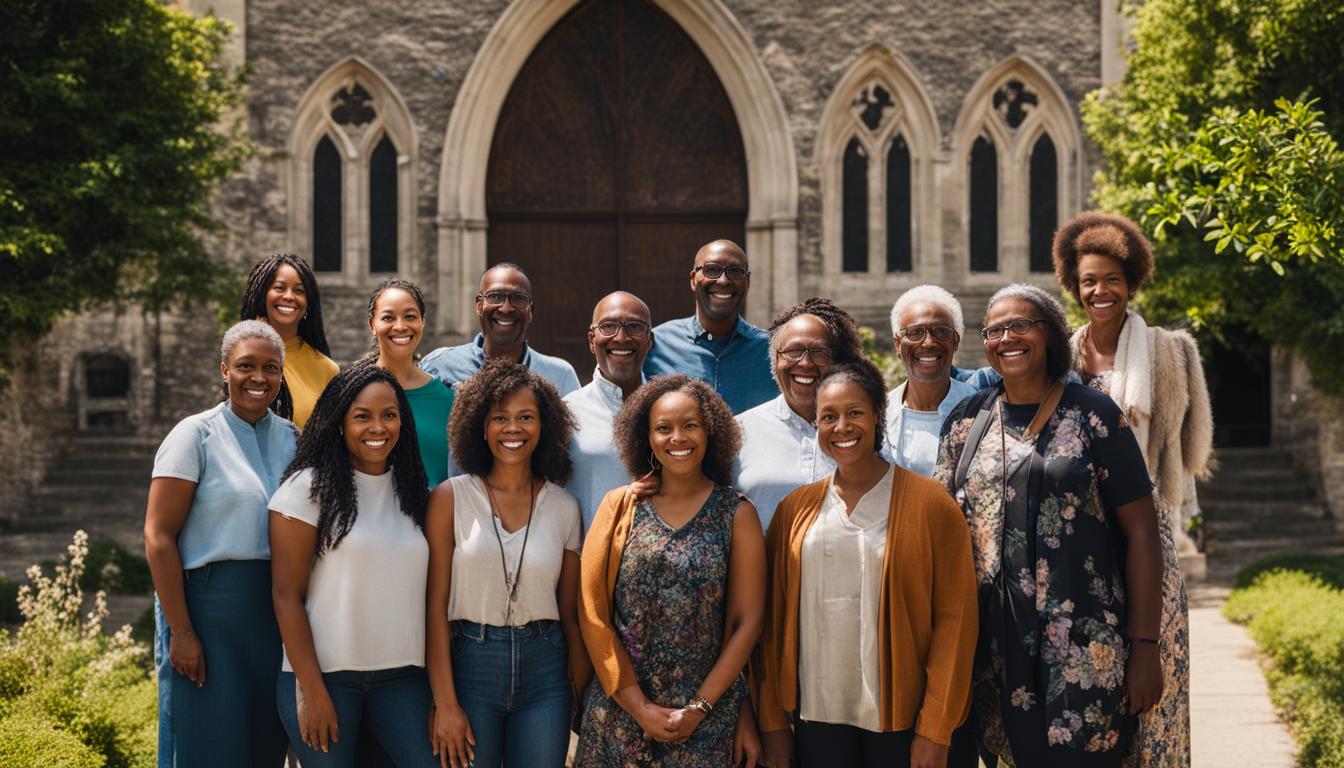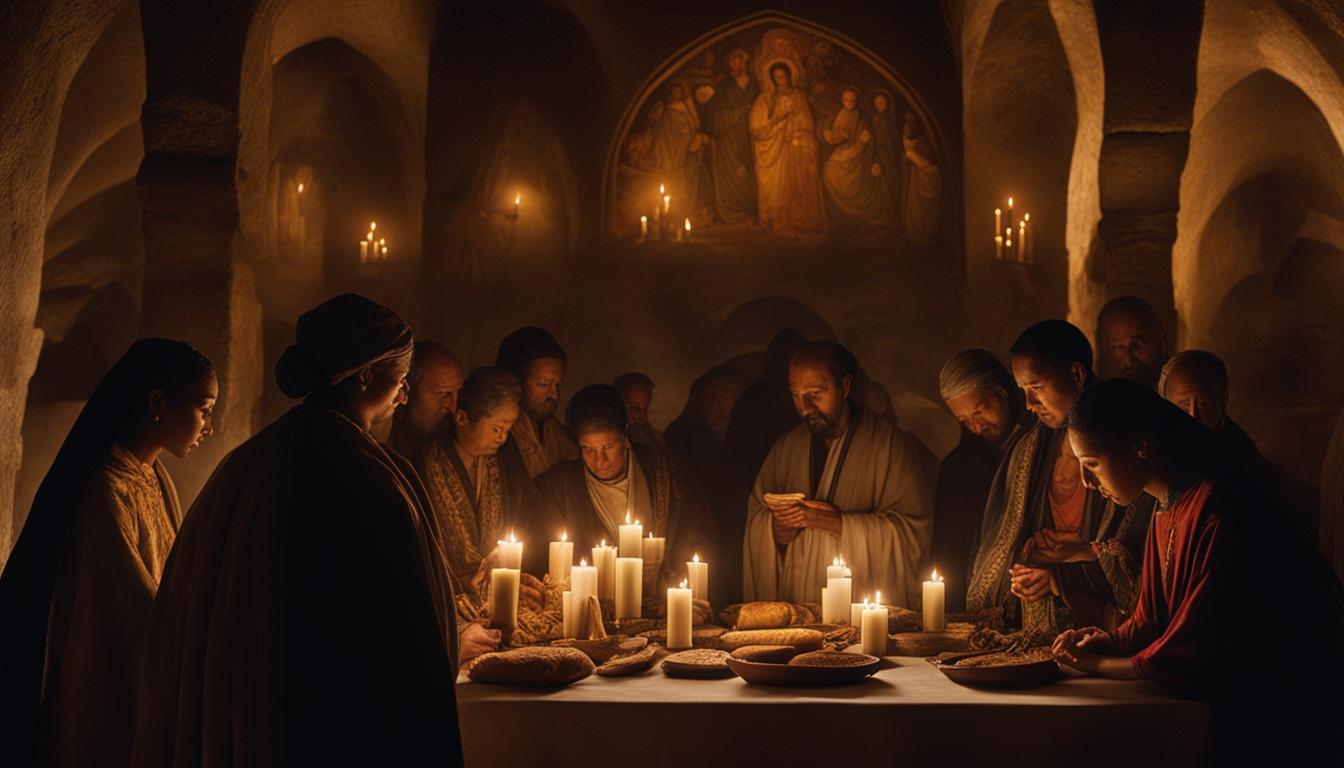Church discipline is a fundamental aspect of faith communities, rooted in biblical principles and aimed at promoting spiritual restoration and strengthening the church as a whole. In this comprehensive guide, we will explore the importance of church discipline, delve into the process of implementing it, and examine its significance in maintaining the health and unity of a faith community.
Key Takeaways:
- Church discipline is vital for restoring believers and strengthening the church.
- It follows a step-by-step process based on biblical principles.
- Church discipline aims to bring repentance, forgiveness, and restoration to sinning believers.
- Clear policies and procedures are essential for upholding church discipline.
- Church leaders play a crucial role in implementing and guiding the disciplinary process.
The Purpose of Church Discipline
Church discipline serves a vital purpose within the context of a faith community. Its primary objective is to facilitate the spiritual restoration of fallen members and promote the overall strength and purity of the church. Through the process of church discipline, sinning believers are confronted with their wrongdoing, provided with opportunities for repentance, and ultimately reintegrated into the body of Christ.
The purpose of church discipline is to bring about repentance and forgiveness. It aims to create an environment where individuals can acknowledge their sins, seek forgiveness from God and the community, and experience a renewed relationship with both. This restoration process fosters spiritual growth and deepens one’s commitment to a life of holiness.
Furthermore, church discipline plays a crucial role in maintaining a pure relationship within the congregation. By addressing sin and holding believers accountable for their actions, it helps to preserve the integrity and unity of the faith community. It serves as a witness to the world, demonstrating the commitment of the church to uphold biblical principles and standards of conduct.
The Importance of Spiritual Restoration
“Church discipline seeks to restore fallen believers to a right relationship with God and the community, allowing them to experience the transformative power of God’s forgiveness and grace.” – John 3:16
Spiritual restoration is a significant aspect of church discipline. It recognizes that all individuals are prone to sin and acknowledges the need for intervention when wrongdoing occurs. Through the process of discipline, individuals are given the opportunity to repent, embrace God’s forgiveness, and experience a renewed sense of purpose and belonging within the church.
Restoration also serves as a powerful testimony to the redemptive work of Jesus Christ. It demonstrates the capacity of God’s love and grace to transform lives and bring about genuine change. By prioritizing spiritual restoration, churches affirm their commitment to nurturing and supporting the growth of every believer, fostering a community built on forgiveness, love, and acceptance.
Table: The Process of Church Discipline
| Step | Description |
|---|---|
| 1 | Private Confrontation |
| 2 | Involvement of Witnesses |
| 3 | Bringing the Matter Before the Church |
| 4 | Treating the Unrepentant as an Outsider |
Note: This table outlines the general steps involved in the process of church discipline. It begins with private confrontation between the sinning believer and an individual, followed by the involvement of witnesses if necessary. If the sinning believer remains unrepentant, the matter is then brought before the church. If there is still no repentance, the individual is treated as an outsider and excluded from the fellowship.
The Process of Church Discipline
Church discipline is a deliberate and structured process that aims to address sin, promote spiritual restoration, and protect the integrity of the faith community. It follows a step-by-step approach as outlined in Matthew 18, which emphasizes the importance of private confrontation, the involvement of witnesses, and ultimately, the exclusion of unrepentant individuals from the fellowship.
The Steps of Church Discipline
The process of church discipline begins with private confrontation between the sinning believer and an individual. This initial step allows for personal accountability and the opportunity for repentance without public exposure. If the individual remains unrepentant, additional witnesses are involved to confirm the sin and appeal for repentance.
If the sinning believer still refuses to repent, the matter is then brought before the entire church community. This step seeks to hold the individual accountable in the presence of the larger faith community and offers an opportunity for collective discernment and prayer. If there is still no repentance, the individual is treated as an outsider, excluded from the fellowship until genuine repentance is demonstrated.

The Purpose of Church Discipline Restoration
The purpose of church discipline is not punishment but restoration. It aims to bring the sinning believer back into a right relationship with God and the church, fostering spiritual growth and maturity. By addressing sin and promoting repentance, church discipline seeks to restore fellowship, unity, and purity within the faith community.
Ultimately, church discipline is an expression of love and care for the individual and the entire congregation. It is a process that requires wisdom, discernment, and a commitment to extended grace and mercy. Through the process of church discipline restoration, the church demonstrates its commitment to uphold biblical principles and cultivate a thriving community of believers.
Biblical Foundations of Church Discipline
Church discipline is firmly rooted in biblical principles that provide guidance for handling sin within the faith community. These principles are crucial for maintaining spiritual purity and fostering a healthy and united congregation.
The foundation for church discipline can be found in Matthew 18:15-17, where Jesus instructs his disciples on how to address sin within the community of believers. This passage serves as a blueprint for the church discipline process, emphasizing the importance of private confrontation, the involvement of witnesses, and the ultimate goal of restoration.
By following these biblical principles, churches create a framework that promotes accountability, repentance, and spiritual growth. The process of church discipline is not meant to be punitive but rather a means of restoring fallen members and strengthening the body of Christ as a whole.
The Biblical Principles of Church Discipline
1. Private Confrontation: The first step in church discipline is a one-on-one conversation between the sinning believer and an individual from the church who has witnessed the sin. This private confrontation offers an opportunity for repentance, reconciliation, and restoration.
2. Involvement of Witnesses: If the sinning believer does not respond to the private confrontation, additional witnesses are brought in to provide further accountability and clarity. Their involvement is aimed at encouraging repentance and ensuring a fair process.
3. Involvement of the Church: If the sinning believer remains unrepentant, the matter is brought before the entire church. This step emphasizes the seriousness of the sin and seeks to create a collective effort towards restoration.
Overall, these biblical principles of church discipline serve as guidelines for handling sin within the church community, aiming for restoration, growth, and spiritual health.
The Significance of Church Discipline
Church discipline holds significant importance in the life of a faith community. It serves as a means to maintain spiritual purity, promote accountability, ensure the health and unity of the church, and bear witness to the world. By establishing clear church discipline policies and procedures, congregations can uphold these principles and create a thriving environment for spiritual growth.
One of the primary reasons for the importance of church discipline is its role in maintaining spiritual purity. When sin goes unaddressed within the church, it can spread like a cancer, tarnishing the reputation of the congregation and hindering the effectiveness of its mission. Church discipline acts as a safeguard, ensuring that sin is confronted and dealt with according to biblical principles.
Furthermore, church discipline promotes accountability among believers. By holding each other to a high standard of conduct, members of the church are encouraged to live in obedience to God’s commands. This accountability not only strengthens individual faith, but also fosters a sense of unity and shared responsibility within the community.
Lastly, church discipline serves as a witness to the world. When the church demonstrates its commitment to holiness and restoration, it presents a compelling example of God’s transforming power. It shows that the body of Christ is a place of grace, forgiveness, and redemption, which can draw others towards the truth of the Gospel.
| Importance of Church Discipline | Key Points |
|---|---|
| Maintains spiritual purity | Addressing sin within the church |
| Promotes accountability | Holding believers to a high standard |
| Ensures church health and unity | Creating an environment for spiritual growth |
| Serves as a witness to the world | Demonstrating God’s transforming power |
The Role of Church Leaders in Discipline
The role of church leaders is crucial in implementing church discipline and upholding the biblical principles of restoration and accountability within the congregation. Pastors and elders are entrusted with the responsibility of initiating and overseeing the disciplinary process, ensuring that it is carried out with love, wisdom, and a commitment to the spiritual well-being of the individuals involved.
Church leaders serve as shepherds, guiding the church through the process of discipline and restoration. They are called to confront sinning believers with grace and truth, providing them with guidance and support as they navigate the path of repentance and forgiveness. It is their duty to ensure that the principles of church discipline are followed diligently, while also fostering an environment of grace and restoration.
By taking on this leadership role, pastors and elders demonstrate their commitment to the spiritual health and unity of the church. They are responsible for making difficult decisions that may involve temporarily removing individuals from fellowship, all the while seeking the ultimate goal of restoration and reconciliation. Through their leadership, church leaders set an example for the congregation, showing the importance of accountability and the pursuit of holiness.

Responsibilities of Church Leaders
Church leaders play various important roles in the process of church discipline. Some of their key responsibilities include:
- Initiating and overseeing the disciplinary process in accordance with biblical principles.
- Confronting sinning believers with love, grace, and the truth of God’s Word.
- Providing counseling, guidance, and support to those involved in the disciplinary process.
- Maintaining confidentiality and handling sensitive information with care.
- Facilitating reconciliation and restoration between the sinning believer and the church.
- Ensuring that the disciplinary process is carried out in a fair and just manner.
“Leaders must approach church discipline with humility, seeking the guidance of the Holy Spirit and relying on the wisdom found in Scripture. They must remember that their ultimate goal is not punishment, but the restoration and spiritual growth of those involved.”
Church leaders are called to exercise their authority with humility and compassion, always seeking the guidance of the Holy Spirit and relying on the wisdom found in Scripture. They must remember that their ultimate goal is not punishment, but the restoration and spiritual growth of those involved. By fulfilling their role with integrity and grace, church leaders contribute to the health and well-being of the congregation as a whole.
Church Discipline and Membership
Church discipline is an essential aspect of maintaining the integrity and purity of a faith community. It serves as a means of upholding the beliefs and values of the church and ensuring that all members are accountable for their actions. The process of church discipline is intricately tied to church membership, as it involves addressing issues that may pose a threat to the overall well-being of the congregation.
When a member of the church engages in behavior that goes against the teachings of the faith, church leaders have a responsibility to address the situation. Through the process of church discipline, the aim is not to condemn or ostracize the individual, but rather to guide them towards repentance and restoration.
Membership in a church is a commitment to living in accordance with its teachings and principles. When a member strays from this commitment, church discipline provides a framework for correction and growth. By addressing issues promptly and lovingly, the church can protect its members and maintain a healthy and vibrant community of believers.
| Benefits of Church Discipline for Membership |
|---|
| Promotes spiritual growth and accountability among members |
| Encourages a culture of repentance, forgiveness, and restoration |
| Ensures the health and unity of the church body |
| Safeguards the integrity and purity of the congregation |
Church discipline is not meant to be a punitive measure but rather a loving act of correction and restoration. It is designed to guide members back to the path of righteousness and encourage spiritual growth. By upholding church discipline and membership standards, faith communities can foster an environment of grace, accountability, and love.
The Restoration Process
Restoration is the ultimate goal of church discipline. It is a process aimed at bringing sinning believers back into full fellowship with the body of Christ, promoting spiritual growth and ongoing commitment to a life of holiness. The restoration process involves providing support, accountability, and guidance to ensure the individual’s successful reintegration into the faith community.
Guided by biblical principles, the restoration process begins with the repentance and seeking of forgiveness by the sinning believer. This step is crucial in acknowledging the wrongdoing and expressing a genuine desire for reconciliation with God and fellow believers. The church community, in turn, extends grace and forgives, embracing the repentant individual with open arms.
Throughout the restoration process, mentors and leaders play a vital role in providing guidance and support. They help the repentant believer navigate the challenges of overcoming sin, providing spiritual counsel, and encouraging personal growth. This includes regular check-ins, discipleship, and prayerful guidance to ensure the individual remains on the path of spiritual restoration and continues growing in their relationship with God.

Restoration is a journey that requires time and patience. It involves rebuilding trust, addressing the consequences of sin, and reestablishing a strong foundation rooted in God’s love and grace. The entire faith community plays a crucial role in fostering an environment of acceptance, understanding, and support as the restored believer continues on their path of spiritual growth.
Conclusion
In conclusion, church discipline plays a pivotal role in the life of a faith community. It is a biblical practice rooted in love and aimed at restoring believers to fellowship and promoting spiritual growth. By following the prescribed steps and principles, churches can navigate disciplinary situations with grace and wisdom.
Disciplinary action in the church is not wielded as a weapon of punishment, but rather as a means of restoration. It serves as a gentle reminder of the importance of accountability and upholding the values and beliefs of the community. Through the process of church discipline, individuals are given the opportunity to repent, seek forgiveness, and grow in their faith.
Ultimately, church discipline contributes to the overall health and unity of the church. It ensures spiritual purity, promotes a culture of love and accountability, and stands as a witness to the world. By embracing church discipline, faith communities can create an environment where individuals can experience true forgiveness, restoration, and a renewed commitment to a life of holiness.
FAQ
What is church discipline?
Church discipline is a practice within faith communities aimed at addressing sin and promoting spiritual restoration. It involves following biblical principles and implementing a step-by-step process to restore fallen believers to fellowship and strengthen the church as a whole.
Why is church discipline important?
Church discipline is important because it helps maintain spiritual purity, promotes accountability, ensures the health and unity of the church, and serves as a witness to the world. It upholds the beliefs and values of the community and addresses issues that may pose a threat to the overall well-being of the church.
What is the process of church discipline?
The process of church discipline, as outlined in Matthew 18, begins with private confrontation between the sinning believer and an individual. If the sinning believer remains unrepentant, more witnesses are involved. If there is still no repentance, the matter is brought before the church, and if necessary, the individual is excluded from the fellowship.
What are the biblical foundations of church discipline?
The biblical foundation for church discipline can be found in Matthew 18:15-17, where Jesus instructs his disciples on how to handle sin within the community of believers. These principles serve as guidelines for modern churches, emphasizing private confrontation, the involvement of witnesses, and the ultimate goal of restoration.
What is the role of church leaders in implementing church discipline?
Church leaders, particularly pastors and elders, play a crucial role in implementing church discipline. They initiate and oversee the disciplinary process, confront sinning believers with love and wisdom, and guide the church through the restoration process, providing support, accountability, and guidance.
How does church discipline relate to church membership?
Church discipline is intricately tied to church membership. It is a means of protecting the integrity and purity of the congregation, ensuring that members uphold the beliefs and values of the community. It also serves as a mechanism for addressing issues that may pose a threat to the overall well-being of the church.
What is the purpose of church discipline?
The purpose of church discipline is to restore fallen members spiritually and strengthen the church. It seeks to bring repentance and forgiveness to sinning believers, leading to their reintegration into the body of Christ and fostering a pure relationship within the congregation.
What is the restoration process in church discipline?
The restoration process involves providing support, accountability, and guidance to a sinning believer who has repented and sought forgiveness. The aim is to ensure their ongoing spiritual growth and commitment to a life of holiness, welcoming them back into full fellowship with the body of Christ.
















